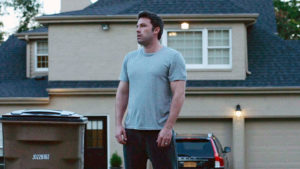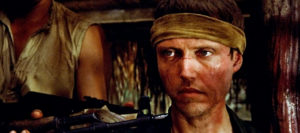During the summer holiday, one week of family viewing was devoted to the Hunger Games series. It reminded me what a vintage star-is-born story it was when Jennifer Lawrence went from the indie hit to Winter’s Bone to making The Hunger Games and the Oscar-winning Silver Linings Playbook in the same year, so I googled how she got started. Her family was on holiday in New York from Kentucky when a talent scout spotted the 14-year-old in the street and suggested that she try modelling. She chose acting instead. “I had that feeling like, I understand this,” she told Vanity Fair. “This is the first time I’ve ever understood anything.”
You have to love the fairytale serendipity of that backstory: one chance encounter and a life is changed — but another kind feels increasingly common. While watching Normal People, I looked up Daisy Edgar-Jones and learned that she was the privately-educated daughter of a film editor and the former head of entertainment at Sky. Does that make her performance any less impressive? Not a jot. But it does make her a nepotism baby.
Back in February, a young Euphoria fan called Meriem Darradji tweeted: “Wait I just found out that the actress that plays Lexie is a nepotism baby omg [crying emoji]. Her mom is Leslie Mann and her dad is a movie director lol.” Darradji’s surprise was surprising. Apatow has a distinctive surname and five of her seven big-screen credits are in movies directed by her dad, so she’s hardly working undercover. Still, the phrase took off with TikTok users, who quickly improvised a taxonomy of nepotism — actors with wealthy, well-connected parents are less suspect than those with bona fide movie stars in the family for example. Some said how disappointing it was to click on the Wikipedia page of a hot young newcomer and see that their parents already had their own blue-linked entries, while others were enthralled by this Hollywood quasi-aristocracy.
Whether the phrase is contemptuous, affectionate or ambivalent depends on who’s using it but, as the softness of the word baby implies, the tone is usually more playful than angry. It’s an amusing way to interrogate privilege, inequality, the limits to social mobility and the promise of meritocracy. Nepotism, which entered English from the Italian in the 17th century, isn’t quite the right word for this phenomenon. It strictly means favouring one’s relatives with privileged positions, which is easy to achieve in business and politics but less so in an industry where employment is episodic and unpredictable. You couldn’t make Succession about a family of actors because there is no glittering prize to bestow on a favoured son or daughter. The advantages that second-generation celebrities enjoy are more nebulous. Connections, of course. A familiarity with how things work, from film sets to the paparazzi. And, let’s be honest, genes: beautiful people make beautiful people. (Exhibit A: Zoe Kravitz.)
No industry, therefore, has as many nepotism babies as modelling, where the likes of Lila Moss, Kaia Gerber, Iris Law and the Hadid siblings make the old tradition of scouts plucking gorgeous unknowns from provincial shopping centres seem quaint. Conversely, musical talent does not seem to be hereditary; very few major artists have famous parents. In fact, as Julian Lennon or Jakob Dylan will tell you, there is such violent suspicion of anyone seen to be trading on a famous surname that failure is more likely than not.
Acting, a field in which looks and charisma go a long way but aren’t enough on their own, falls somewhere in between. Hollywood has always been a place where the American dream could seem like more than spin. As the title of his autobiography, The Ragman’s Son, indicates, Kirk Douglas literally went from rags to riches. Marilyn Monroe grew up in foster homes and orphanages. “I didn’t like the world around me because it was kind of grim, but I loved to play house,” she said. “When I heard that this was acting, I said that’s what I want to be. You can play.”
At the same time, it was an industry where dynasties mattered: the Barrymores, the Hustons, the Fondas. Liza Minnelli, Carrie Fisher, Jamie Lee Curtis and Isabella Rossellini all had at least one very famous parent. No doubt it is easier to get a break if you’re the child of Debbie Reynolds and Eddie Fisher but many of these celebrity scions felt anxiety about their privilege and how it was perceived. Nicolas Cage changed his surname from Coppola to avert suspicion of favouritism and begged interviewers not to mention the fact that his uncle directed The Godfather.
“I’m really a product of nepotism,” Jeff Bridges once told me. “I was literally carried onto a film set when I was six months old… Usually one of the hardest things is getting your foot in the door so that was kind of handled. But I had to prove to myself that I didn’t get the job because of whose son I was — that I had some real talent. It took a few years for me to say, oh, OK, I guess I have some value of my own.” Of course, Bridges went on to have a far more substantial career than both his father Lloyd, who is best remembered for the Airplane! movies, and his brother Beau, which suggests that ultimately it’s the work that counts. That takes time though.
It was a while before it became obvious that Ben Stiller or Michael Douglas were stars in their own right. “As the child of someone, you get access other people don’t have, so the playing field is not level in that way,” Gwyneth Paltrow (daughter of Blythe Danner and Bruce Paltrow) recently explained to model Hailey Bieber (daughter of Stephen Baldwin). “However, I really do feel that once your foot is in the door, which you unfairly got in, then you almost have to work twice as hard and be twice as good because people are ready to pull you down and say… ‘You are only there because of your dad or your mum.’” The phrasing is typically tone-deaf — are other actors half as good and working half as hard? — but Paltrow earned her place. Like Stiller and Bridges, she eclipsed her parents.
Nepotism babies inspire ambivalence because most of them are clearly talented and apparently charming. A list of the most interesting young actors around would include Dakota Johnson, Margaret Qualley, John David Washington, Zoe Kravitz and Riley Keough. Even those whose unusually prestigious debuts would appear to scream nepotism — Philip Seymour Hoffman’s son Cooper in Licorice Pizza; James Gandolfini’s son Michael playing the young Tony Soprano in The Many Saints of Newark — garnered great reviews across the board.
Perhaps the only really glaring case of unearned familial privilege is Brooklyn Beckham, who is true celebrity royalty in the sense that he has nothing to offer except his bloodline. Fame is both his birthright and, in lieu of discernible talent, his job. The smart ones are honest about their advantages. “I think I’ll get a couple chances on their name and then if I suck, I’ll get kicked out of the kingdom,” Maya Hawke (daughter of Ethan Hawke and Uma Thurman) told People. “And that’s what should happen.”
This new fascination with nepotism reminds me of the fuss, a decade ago, about old Etonian or Harrovian actors such as Benedict Cumberbatch, Tom Hiddleston and Eddie Redmayne. They were obviously gifted, and nobody seriously believed that the headmaster of Eton could phone a movie director and secure a plum role as easily as a starter job in the City. Yet there were so many of them, all at once, that something smelled off. Individuals became lightning rods for a broader concern that the game — meaning society rather than Hollywood — was rigged.
That debate came in the wake of the financial crisis and the Occupy movement. Talk of nepotism babies coincides with another wave of economic anxiety and heightened awareness of inequality. Yet the conversation is for the most part refreshingly clear-eyed, curious and nuanced. It’s not the individual that matters; it’s the ecosystem. If there is still diversity of experience and opportunity, and most actors haven’t grown up in the industry, then a nepotism baby is an object of curiosity rather than a systemic problem. There is a healthy sense of perspective, too. As long as people like Eric Trump exist, one can’t get too het up about Maude Apatow.
I think that Bridges and Paltrow are right to suggest that Hollywood is not a meritocracy in the short term but becomes more so in the long term. Talent outlives good fortune. The perfect test case is Sofia Coppola, who experienced what you might call a nepotism baby do-over. After Winona Ryder dropped out of The Godfather Part III, Francis Ford Coppola cast 18-year-old Sofia as Michael Corleone’s daughter Mary. She bombed. On top of her lousy screen presence, the impression that the role was entirely undeserved inspired such brutal reviews that she gave up acting all together. “I didn’t realise how much pressure I would be under — people want to see Francis’s daughter fall on her face,” she told Entertainment Weekly. A decade later, though, she directed The Virgin Suicides, a debut so confident, distinctive and unbeholden to her father that she could start again. You can’t help noticing that all of her films have been about the privileged and unhappy.
Disclaimer
Some of the posts we share are controversial and we do not necessarily agree with them in the whole extend. Sometimes we agree with the content or part of it but we do not agree with the narration or language. Nevertheless we find them somehow interesting, valuable and/or informative or we share them, because we strongly believe in freedom of speech, free press and journalism. We strongly encourage you to have a critical approach to all the content, do your own research and analysis to build your own opinion.
We would be glad to have your feedback.
Source: UnHerd Read the original article here: https://unherd.com/




